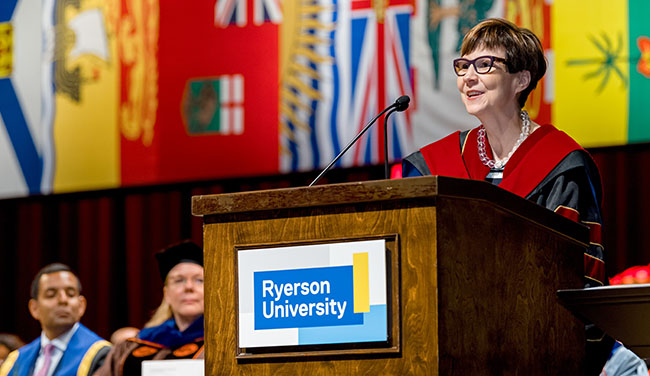Blackstock receives honourary degree from Ryerson

By Rick Garrick
TORONTO – First Nations Child and Family Caring Society of Canada executive director Cindy Blackstock was recognized on June 6 for her work on Indigenous children’s rights by Ryerson University. The Gitksan First Nation citizen was presented with an honourary Doctor of Laws degree at Ryerson’s Faculty of Arts ceremony at the Ryerson Theatre in Toronto.
“These awards are not about me — they are really to recognize the strength and dignity of the 165,000 First Nations children and young people across Canada who are currently receiving inequitable services and are joining together with their families and with leadership and with non-Indigenous allies to change that,” Blackstock says. “It’s a collective award. It’s a way of recognizing how poorly treated really this generation of First Nations children is by the government of Canada and the growing calls on the government of Canada from people of all walks of life to do far better and to comply with the Canadian Human Rights Tribunal’s (CHRT) ruling.”
The CHRT ordered INAC (Indigenous and Northern Affairs Canada) in a January 2016 decision “to cease its discriminatory practices and reform the FNCFS (First Nations Child and Family Services) Program and 1965 Agreement to reflect the findings in this decision.” INAC was “also ordered to cease applying its narrow definition of Jordan’s Principle and to take measures to immediately implement the full meaning and scope of Jordan’s Principle” in the decision.
The First Nations Child and Family Caring Society of Canada, along with the Assembly of First Nations, filed a complaint in 2007 with the CHRT that the federal government discriminates “in providing child and family services to First Nations on reserve and in the Yukon, on the basis of race and/or national or ethnic origin, by providing inequitable and insufficient funding for those services.”
Blackstock notes that the federal government has been subject to three non-compliance orders since the January 2016 decision.
“The most recent one came in May and it actually linked the tragic deaths by suicide of the two girls from Wapekeka to Canada’s non-compliance to these orders because one of the things that was discussed at the (CHRT) was Canada’s failure to provide equitable mental health services,” Blackstock says. “And just yesterday we heard about the tragic dying of another 12-year-old child in that community.”
Blackstock says the consequences of Canada’s non-compliance are significant, adding that the January 2016 CHRT decision and the three non-compliance orders occurred during the term of the current federal government.
“I really believe that if we can raise a generation of First Nations children who have a fair chance to grow up happily and safely in their families, get a good education, be healthy and proud of who they are, then they will be better prepared to deal with a lot of the other challenging issues like land claims and resource management,” Blackstock says. “Our best challenge as Indigenous peoples is to raise healthy kids and to also raise a generation of non-Indigenous kids who know about Canada’s history, know about colonialism and are prepared to address it in society so that it is not just something that is tossed off as a relic from the past that we can forget about, that it is actually something that we need to pay attention to. And that type of vigilance is necessary for the TRC’s Calls to Action.”
Ryerson also presented honourary doctorate degrees to David McKay, president and CEO of RBC, on June 7 and Masai Ujiri, president of the Toronto Raptors, on June 8.

